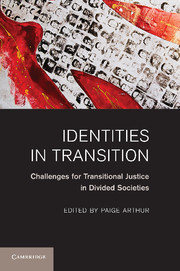Book contents
- Frontmatter
- Contents
- Acknowledgments
- Author Bios
- Introduction: Identities in Transition
- PART I IDENTITY IN TRANSITIONAL JUSTICE MEASURES
- 1 Indigenous Peoples and Claims for Reparation: Tentative Steps in Peru and Guatemala
- 2 Truth Telling, Identities, and Power in South Africa and Guatemala
- 3 Security System Reform and Identity in Divided Societies: Lessons from Northern Ireland
- 4 Staging Violence, Staging Identities: Identity Politics in Domestic Prosecutions
- 5 International and Hybrid Criminal Tribunals: Reconciling or Stigmatizing?
- 6 Silences, Visibility, and Agency: Ethnicity, Class, and Gender in Public Memorialization
- PART II IDENTITIES, TRANSITION, AND TRANSFORMATION
- Index
5 - International and Hybrid Criminal Tribunals: Reconciling or Stigmatizing?
Published online by Cambridge University Press: 01 March 2011
- Frontmatter
- Contents
- Acknowledgments
- Author Bios
- Introduction: Identities in Transition
- PART I IDENTITY IN TRANSITIONAL JUSTICE MEASURES
- 1 Indigenous Peoples and Claims for Reparation: Tentative Steps in Peru and Guatemala
- 2 Truth Telling, Identities, and Power in South Africa and Guatemala
- 3 Security System Reform and Identity in Divided Societies: Lessons from Northern Ireland
- 4 Staging Violence, Staging Identities: Identity Politics in Domestic Prosecutions
- 5 International and Hybrid Criminal Tribunals: Reconciling or Stigmatizing?
- 6 Silences, Visibility, and Agency: Ethnicity, Class, and Gender in Public Memorialization
- PART II IDENTITIES, TRANSITION, AND TRANSFORMATION
- Index
Summary
In contexts marked by the occurrence of atrocities and crimes, the judicial systems of the affected countries may be unable or unwilling to investigate and judge those responsible. This is particularly true in divided societies, split along ethnic, religious, linguistic, or other identity lines. In such contexts, law enforcement institutions, including the police, prosecutors, and courts, are often themselves marked by identity-based tensions or divides. By their very composition, functioning, and limitations, they often reflect the society in which they operate, for better or for worse.
This chapter will concentrate on cases in which the international community intervenes in the prosecution of those responsible for international crimes committed against the members of an identity-based group. This intervention may be through the provision of international support to the domestic judicial systems, or by complementing or temporarily replacing domestic criminal systems with international or hybrid jurisdictions. In the cases of both the former Yugoslavia and Rwanda, new international criminal tribunals were established by the United Nations Security Council in the early 1990s to bring to account those responsible for the crimes committed in these countries. In Bosnia-Herzegovina, so-called hybrid chambers, mixing national and international elements, were later created. The establishment, funding, and operations of the federal domestic court in which these chambers sit have been facilitated by strong international support and involvement.
- Type
- Chapter
- Information
- Identities in TransitionChallenges for Transitional Justice in Divided Societies, pp. 149 - 186Publisher: Cambridge University PressPrint publication year: 2010
- 2
- Cited by

